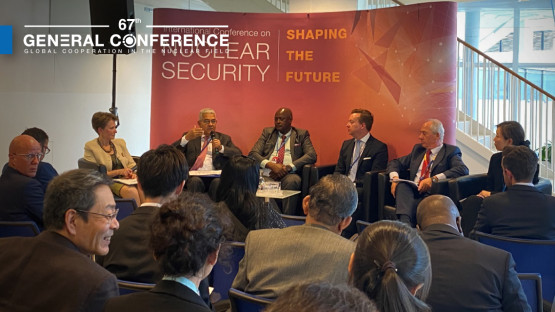The footprint of past ministerial conferences on nuclear security in the work of the international nuclear security community, especially through the adoption of ministerial declarations and countries’ active participation, was the main thread of discussion at a side event held on the margins of the 67th IAEA General Conference. The event was organized in light of the upcoming International Ministerial Conference on Nuclear Security (ICONS 2024) planned for May 2024.
The deadline for abstracts submission for ICONS 2024 has been extended to 16 October for oral and poster presentations under four themes: policy and regulations for nuclear security; technology and infrastructure for nuclear security prevention, detection and response; capacity building for nuclear security; and cross-cutting nuclear security topics.
“Shaping the future of nuclear security requires a profound knowledge of the past, and today’s event brings together major contributors of past ICONS to share their experience and valuable insights,” said Elena Buglova, Director of the IAEA’s Division of Nuclear Security in her introductory remarks. “ICONS 2024 will build on the successes of the ICONS held in 2013, 2016, and most recently, in 2020.”
The panel discussion, hosted representatives from Hungary, Nigeria, Panama, the Republic of Korea and Romania. All five countries have served past ICONS in different presidential or committee roles.
“I fully agree with the view of the 2020 ICONS participants that the international community must keep nuclear security high on its agenda, which was also enshrined in the consensual ministerial declaration adopted, and that while responsibility for nuclear security rests with individual States, in our globalized world, international cooperation in this area, too, is indispensable. In this context, I consider of great importance that the 2024 conference continue to build on the results of the previous ICONS,” said Ambassador Ferenc Dancs of Hungary. “Hungary stands ready to work with all of you throughout this conference in the interest of our shared vision of enhanced nuclear security,” he added.
In line with past ICONS, at the upcoming ICONS 2024, countries will work to put forward a ministerial declaration reflecting their priorities in nuclear security, which will subsequently inform the IAEA Nuclear Security Plan for the years 2026-2029.
“ICONS 2024 is more important than ever, because we all need to re-commit to nuclear security at the highest political level,” said Ambassador Dario Ernesto Chiru of Panama. “There are new nuclear security risks and challenges, and we need to talk about them,” he added, appealing for broad participation in the ICONS ministerial segment.
In addition, the ICONS scientific and technical segment will provide a forum for countries to discuss and exchange information about the opportunities and challenges that scientific and technical innovations present to enhancing global nuclear security.
The impact of ICONS empowers countries to further strengthen their national nuclear security regimes. Reflecting on his country’s experience Yau Usman Idris, Director General/CEO of the Nigerian Nuclear Regulatory Authority, shared his country’s perspective during the panel discussion. “Considering that the responsibility for nuclear security within a State rests entirely with that State, Nigeria recognizes the central role of the IAEA in strengthening the nuclear security framework globally and in coordinating international cooperation in nuclear security.” In July, Nigeria hosted an International Physical Protection Advisory Service (IPPAS) in order to further strengthen its national nuclear security regime, measures and systems. “Nigeria has established a National Nuclear Security Coordination Center and is currently updating its legislative and regulatory framework in line with the IPPAS findings,” Idris added.
The panel discussion also addressed issues concerning the future of nuclear security and discussed the expected focus of the ICONS 2024 Ministerial Declaration.
Na Young Lee, President of the Korea Institute of Nuclear Nonproliferation and Control (KINAC), said that “ICONS has provided periodic opportunities for nuclear security experts to share their good practices and state of the art technologies in combatting emerging threats, and the Republic of Korea values this opportunity to enhance its own nuclear security system and will continue to provide the utmost support to build a robust regime for international nuclear security.” Commenting on attracting the next generation to pursue careers in nuclear security, she said, “We need to place greater emphasis on the importance of nuclear security and promote awareness of it. ICONS provides an appropriate platform for this purpose, and I expect to foster interest and support at every level and every generation of interested parties for shaping the future of nuclear security, with ICONS 2024 and its ministerial segment as momentum.”



